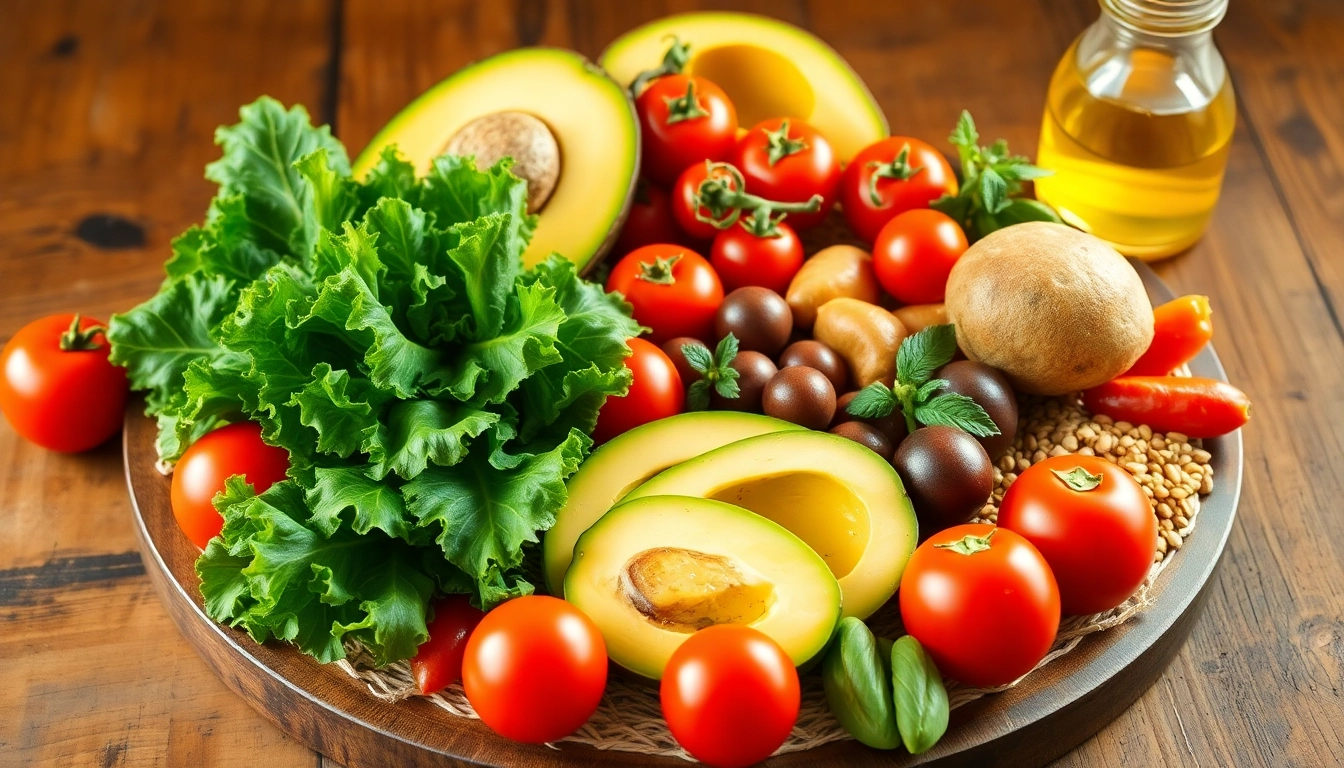The Ultimate Guide to Healthy Food Choices for 2024

Understanding Healthy Food
What is Healthy Food?
Healthy food refers to food choices that provide the necessary nutrients our bodies need to function optimally. These include macronutrients such as proteins, carbohydrates, and fats, as well as micronutrients like vitamins and minerals. Typically, healthy food is rich in natural ingredients, minimally processed, and free from harmful additives or excessive sugars and salts. As we strive to improve our diets, it’s essential to understand that healthy food encompasses a wide variety of choices, including healthy food groups.
Benefits of Eating Healthy Food
The benefits of incorporating healthy food into our diets are extensive and well-researched. Regular consumption of nutritious foods can lead to improved physical health, including:
- Weight Management: Eating a balanced diet supports healthy weight maintenance and can prevent obesity.
- Reduced Risk of Chronic Diseases: A diet rich in fruits, vegetables, whole grains, and lean proteins can lower the risk of heart disease, diabetes, and certain cancers.
- Improved Mental Health: Nutrition plays a role in brain health and mood regulation, with some studies linking healthy eating patterns to reduced anxiety and depression levels.
- Enhanced Energy Levels: Consuming quality nutrients helps sustain energy throughout the day, improving overall performance and productivity.
Common Misconceptions About Healthy Food
Despite the growing emphasis on healthy eating, many misconceptions persist:
- Healthy Food is Expensive: While some organic and specialty health foods can be costly, many healthy options like legumes, grains, and seasonal fruits and vegetables are affordable and accessible.
- Healthy Food is Boring: Many believe healthy eating limits flavor and variety. However, with creative cooking techniques and a range of global cuisines, healthy food can be incredibly diverse and enjoyable.
- All Fats are Bad: Fats are essential for health. The key is to choose healthy fats like avocados, nuts, and olive oil while avoiding trans fats found in many processed foods.
Top Healthy Food Options
Fresh Fruits and Vegetables
Fruits and vegetables are the cornerstone of a healthy diet, providing essential vitamins, minerals, and fiber. They are low in calories but high in nutrients, making them an excellent choice for weight management. Aim for a colorful variety to ensure you receive a broad spectrum of nutrients. Some superfoods to consider include:
- Blueberries: High in antioxidants, they support brain health and may reduce the risk of heart disease.
- Spinach: Packed with iron and vitamins A and C, this leafy green is vital for overall health.
- Sweet Potatoes: Rich in fiber, vitamins, and minerals, they are a nutritious carbohydrate source.
Whole Grains and Their Benefits
Whole grains like brown rice, quinoa, and whole wheat bread are unrefined grains that retain their nutrient-rich bran and germ layers. Benefits of incorporating whole grains into your diet include:
- Digestive Health: High fiber content aids digestion and maintains gut health.
- Sustained Energy: Their complex carbohydrates provide long-lasting energy, perfect for active lifestyles.
- Heart Health: Whole grains can lower cholesterol levels and reduce heart disease risk.
Proteins: Choosing Lean Sources
Protein is essential for growth, repair, and overall bodily functions. Selecting lean protein sources can help reduce fat intake while providing essential amino acids. Options include:
- Legumes: Beans, lentils, and chickpeas are high in protein and fiber while low in fat.
- Fish: Fatty fish like salmon and trout provide omega-3 fatty acids critical for brain health.
- Lean Poultry: Chicken and turkey breasts are excellent protein sources with lower saturated fat content compared to red meats.
Incorporating Healthy Food into Your Daily Routine
Meal Planning Basics
Meal planning is a practical approach that can significantly simplify healthy eating. Here are some steps to get started:
- Identify Your Goals: Determine what healthy eating means for you, whether it’s weight loss, muscle gain, or simply eating more nutritious foods.
- Plan Ahead: Dedicate time weekly to plan your meals, focusing on including a variety of food groups.
- Prep and Batch Cook: Prepare ingredients in advance or cook in bulk to save time during the week.
Snacks That Nourish
Snacking can derail healthy eating if not approached mindfully. Choose snacks that provide nourishment and satisfaction:
- Greek Yogurt with Honey: A protein-packed option that satisfies sweet cravings while offering probiotics.
- Nut Mixes: A source of healthy fats and protein, they’re perfect for on-the-go nutrition.
- Veggie Sticks with Hummus: Provides fiber and protein while keeping hunger at bay.
Setting Realistic Healthy Eating Goals
To maintain a successful healthy eating routine, set realistic and achievable goals using the SMART criteria—Specific, Measurable, Achievable, Relevant, and Time-bound:
- Specific: Define clear outcomes, such as “I will eat at least three servings of vegetables daily.”
- Measurable: Track progress through a food diary or app.
- Achievable: Start with small changes to prevent feelings of overwhelm.
- Relevant: Ensure your goals align with your lifestyle and preferences.
- Time-bound: Set a deadline to evaluate your progress.
Avoiding Common Pitfalls in Healthy Eating
Understanding Food Labels
Deciphering food labels is crucial in making informed choices. Key elements to look for include:
- Serving Size: Pay attention to the serving size to understand the nutritional content per portion.
- Ingredients List: Ingredients are listed in order of quantity; starting with the first ingredient usually indicates its dominance in the product.
- Nutritional Claims: Be wary of terms like “fat-free” or “sugar-free,” as they may contain unhealthy additives.
Recognizing Hidden Sugars
Many processed foods contain hidden sugars, which can undermine your healthy eating efforts. Common names for sugar include:
- High fructose corn syrup
- Sucrose
- Agave nectar
- Honey
- Maple syrup
Always check labels for sugar content, especially in seemingly healthy options like granola bars and flavored yogurts.
Dealing with Cravings Effectively
Cravings can be a significant challenge when adopting a healthier diet. Here are strategies to manage them:
- Stay Hydrated: Sometimes, thirst can be mistaken for hunger. Drink water regularly.
- Opt for Healthy Swaps: If you crave sweets, try fruits or dark chocolate in moderation instead.
- Practice Mindfulness: Pay attention to your eating habits and emotions to understand what triggers your cravings.
Measuring the Impact of Healthy Food Choices
Tracking Your Nutrition
To measure the impact of your dietary choices, consider tracking your food intake. This can be done through notebook logging or apps designed for this purpose. Monitoring your eating habits helps identify patterns, assess nutrient intake, and look for areas for improvement.
How to Adjust Dietary Plans Based on Results
After tracking your nutrition, it’s essential to adapt your dietary plan based on results. Assess how your current diet affects your weight, energy levels, and health markers. Adjustments might include:
- Increasing intake of specific nutrients if you identify deficiencies.
- Modifying portion sizes to align with your weight goals.
- Introducing variety to prevent boredom and ensure a range of nutrients.
Real-Life Success Stories
Real-world examples can inspire and motivate your healthy eating journey. Consider Jennifer, who turned her life around by embracing healthy food choices after struggling with obesity. By gradually incorporating fruits and vegetables into her diet while cutting down on processed foods, she lost 50 pounds over several months and improved her overall health. Sharing stories like these can serve as powerful reminders of the impact of healthy food.





